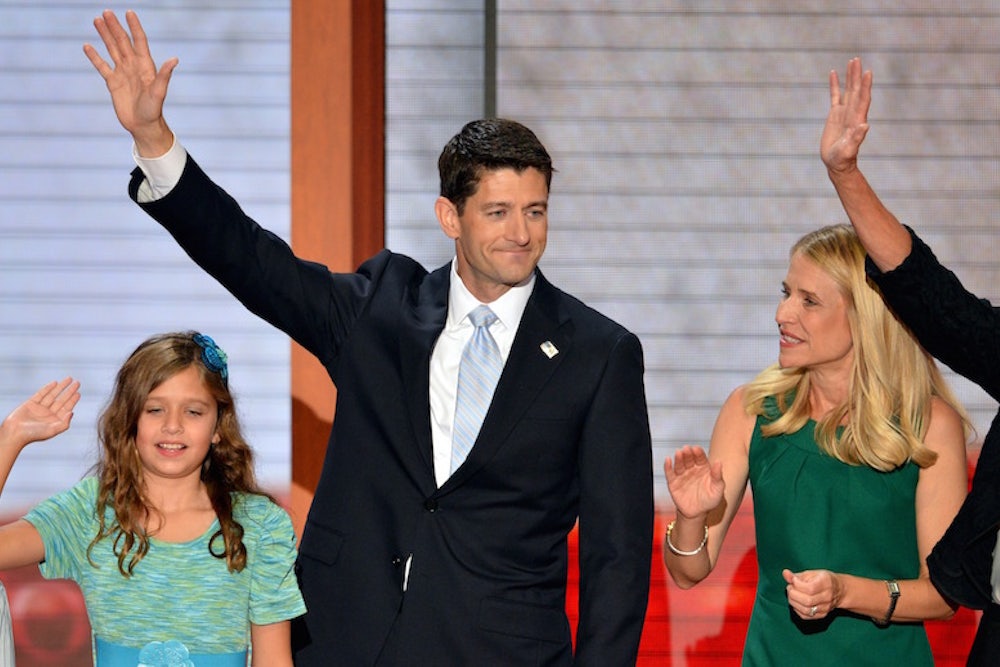Paul Ryan is now the speaker of the House, putting an end to internecine Republican squabbling that began when his predecessor, John Boehner, announced his resignation during Pope Francis’s stateside visit in September. Ryan made headlines in late October when he announced that he would accept the position on the condition that he would still have time to spend with his family, earning him both praise and ire in the media. Perhaps the most curious aspect of the incident, however, was that it took anyone by surprise.
America has been introduced to Paul Ryan before, both during Mitt Romney’s ill-fated 2012 presidential run (wherein Ryan served as his vice presidential pick) and in the congressman’s subsequent campaigns to sell his budget proposal. Then as now, Ryan was defined by a clean-cut, old-fashioned, faith-and-family persona, spoofed by the Daily Show as the “boy next door who used to excite Republicans.”
Ryan’s insistence on family time, in other words, should’ve been expected, along with recent press covering his charitable activities. Conservative columnist Jim Geraghty introduced reports of Ryan’s prayerful meetings with heroin addicts by offering readers a “side of Paul Ryan you probably haven’t seen before,” writing that the congressman’s liberal detractors have depicted him as the sort of person who spends his spare time “throwing granny off a cliff." Geraghty must have forgotten the near-hagiographic coverage of Ryan’s personal survey of American poverty, and the famous soup kitchen photo-op, which, by some accounts, was staged.
The particulars of one photo shoot aside, Ryan has long been lauded for his small-town devotion to faith and family, and there has never been a serious public effort to defame him on that count.
This is because, I suspect, Ryan probably is essentially the way he presents himself. It’s difficult to make sound judgments about someone’s character without personal knowledge of him, but there certainly hasn’t been blatant evidence to contradict Ryan’s claims to being a loving father and committed churchgoer. In all likelihood he really is just such a person, which undoubtedly endears him to voters.
The real question is: Does any of this matter?
Ryan’s political psychology is of the bootstraps sort, where personal virtue stands in for supportive social policy. This reflects his own personal narrative, but it isn’t clear how aggressively stumping for free market capitalism could ever teach or foster virtue, especially since, as Michael Gerson once remarked, capitalism “is a system that depends on virtues it does not create.” Ryan’s chosen political philosophy of expecting private virtues to substitute for public goods is therefore doomed on a couple of counts: first in its lack of implementation, and second in the ethical counter-currents encouraged by shilling for an essentially individualistic, ultra-competitive, winner-take-all economic system.
Ryan is, in other words, an excellent example of all the ways personal virtue fails to serve as a substitute for good policy. While ostensibly viewing family as a universal good (the way the Catholic Church does), Ryan is comfortable allowing the market to decide who can raise their infants and who must delegate their nursing to paid childcare professionals. Want to nurse your baby? Tighten your belt and make more money. Ryan feels the same way about welfare: while family togetherness might be a good thing in the abstract, market institutions should be structured so that only the well-off can afford it, and the poor have to sacrifice it to receive benefits. Civic engagement and charity are good, but housing and its attendant social inclusion should come only to those who have the jobs that make housing affordable. In all cases, the relative freedom of the market is valued above facilitation of family life, social inclusion, and so on: these are matters of private virtue for Ryan, best left up to the individual. The list of examples goes on, which is why the United States Council of Catholic Bishops has been extremely critical of Ryan’s budget proposals, especially his repeated attacks on welfare.
None of which contravenes Ryan’s personal virtue, or his overall private dedication to being a good person and member of his community. It just demonstrates that personal virtue isn’t enough to guarantee decent policy, or policy that manages to spread virtue, or even policy that has some sort of mechanism for encouraging the kind of moral disposition Ryan and his compatriots view as crucial to building healthy societies and economies. Ryan’s personal goodness isn’t a substitute for public goods, and—unfortunately for his preferred politics—neither is anyone else’s.
